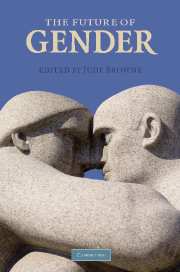Book contents
- Frontmatter
- Contents
- List of figures
- List of tables
- List of contributors
- Acknowledgements
- Introduction
- Part I Reorienting the feminist imagination
- Part II Variations on the theme of gender
- 4 Does biology play any role in sex differences in the mind?
- 5 Sex and the social construction of gender: can feminism and evolutionary psychology be reconciled?
- 6 ‘Trans’ trouble: trans-sexuality and the end of gender
- 7 Gender and social change
- 8 Procreative mothers (sexual difference) and child-free sisters (gender)
- Part III Gender and political practice
- Index
- References
8 - Procreative mothers (sexual difference) and child-free sisters (gender)
Published online by Cambridge University Press: 05 June 2012
- Frontmatter
- Contents
- List of figures
- List of tables
- List of contributors
- Acknowledgements
- Introduction
- Part I Reorienting the feminist imagination
- Part II Variations on the theme of gender
- 4 Does biology play any role in sex differences in the mind?
- 5 Sex and the social construction of gender: can feminism and evolutionary psychology be reconciled?
- 6 ‘Trans’ trouble: trans-sexuality and the end of gender
- 7 Gender and social change
- 8 Procreative mothers (sexual difference) and child-free sisters (gender)
- Part III Gender and political practice
- Index
- References
Summary
Feminism and femininity
Gender, sexual difference and demographic change
In order that the future does not miss out (‘pass’) on feminism, it is necessary for us to consider what feminism we are able to hand on (‘pass on’) to the next generation. Why does it seem to be the case that some benefits but little politics are transmitted? Has feminism created or reflected, or both, a change in the position of women?
The aim of this chapter, then, is to consider the relationship of feminism to social change. In particular my concern is second-wave feminism as it started in the West in the late 1960s. Although my focus is historical, this is not in any way a historical account; instead I have selected specific instances or events which stand as icons for my thesis. The major social change which concerns me is the demographic transition to non-replacement populations. How far did feminism spearhead this, thus putting politics in command, and how far was its advent a reflection of a wider historical process which had thrown up feminism as one of its effects? The connection between feminism and fertility changes has been well noted (Banks and Banks 1964). Here, however, I want to suggest that we have omitted half the equation: the fertility decline not only has women (and men) not reproducing so prolifically as hitherto, but has as its other side the rise to prominence of non-reproductive gender relations which are, to a degree, socially and psychologically autonomous.
- Type
- Chapter
- Information
- The Future of Gender , pp. 163 - 188Publisher: Cambridge University PressPrint publication year: 2007
References
- 3
- Cited by



